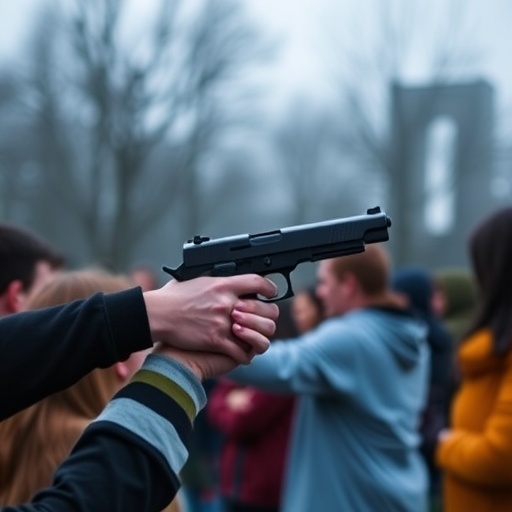In an era dominated by unprecedented mass violence and constant media exposure to shootings, a new study delves into the complex and often contradictory attitudes toward gun control among young adults in the United States. This demographic, frequently labeled the “massacre generation,” has grown up amid continuous reports of mass shootings, lockdown drills, and heightened anxieties about personal safety. However, despite prevalent fears, their views on firearm legislation are far from uniform, revealing a nuanced polarization instead of consensus.
Conducted by researchers at the University of Colorado Boulder along with collaborators from Clemson University and Florida State University, the study employs a nationally representative survey targeting adults aged 18 to 29. This methodology allowed for an in-depth exploration of how fear related to mass shootings correlates with opinions on gun control, parsing out distinctions across political affiliations and gender lines. The researchers aimed to move beyond broad-stroke assumptions that rising political power among Millennials and Generation Z would naturally lead to widespread advocacy for stricter gun laws.
The results uncover a fragmented landscape. Although more than 60% of young adults surveyed expressed some level of worry that a mass shooting could affect their lives, and roughly 17% reported high levels of concern, these fears did not translate to a unified call for tighter restrictions on firearms. Contrary to expectations, subsets of this group—particularly young men, Republicans, and conservatives—demonstrated an inverse relationship: increased fear was associated with stronger opposition to gun control measures.
This counterintuitive finding challenges previous narratives around generational shifts and policy attitudes. It underscores a critical insight that emotional responses to threats do not inherently lead to converging political preferences. Rather, the study highlights how fear of mass violence can deepen ideological divides within a cohort often presumed monolithic regarding gun legislation. This phenomenon illustrates the complexity of translating social anxieties into cohesive public policy demands, especially in a politically polarized environment.
Historically, mass shootings have catalyzed starkly divergent reactions among young Americans. After the 2018 Parkland High School shooting, survivors galvanized the gun-control movement by founding the March for Our Lives organization, emphasizing the urgency of regulatory reform. Conversely, following the tragic Sandy Hook Elementary School shooting in 2012, pro-gun advocates adopted the mantra that armed civilians are essential defenders against gun violence, reflecting a competing vision of safety through firearm accessibility rather than restriction.
The sociological term “massacre generation” encapsulates the context in which these emerging adults have been socialized—an environment saturated with the specter of public shootings and accompanied by preventive measures such as routine lockdown drills in schools and public spaces. The ubiquity of such experiences fosters a pervasive climate of fear, yet this shared psychological backdrop intersects with ingrained political ideologies, resulting in markedly different policy orientations.
Survey questions aimed to quantify the intensity of mass shooting-related fears by asking participants how much they worry about personal or loved ones’ potential victimization in diverse public settings, including large events, shopping centers, educational institutions, and nightlife locations. The aggregation of responses revealed that nearly half of the respondents register moderate fear, while a significant minority remains highly fearful in day-to-day life.
When attitudes toward gun ownership and control were assessed, findings were strikingly polarized. Approximately 58% of respondents believed that owning a gun does not enhance personal safety, yet a substantive 42% disagreed, affirming the protective value of gun ownership. Similarly divided were opinions on specific policy elements: about one-third supported allowing firearms on college campuses, a similar proportion rejected the necessity of permits for carrying guns publicly, and over 40% perceived existing gun control laws as incompatible with constitutional rights.
This data signals that within the younger population, political and gender affiliations strongly mediate how fear translates into policy preferences. For young conservatives, Republicans, and men, rather than viewing gun restrictions as a protective response to fear, they interpret increased anxiety as justification for expanded gun access. This finding illustrates a psychological mechanism where fear bolsters reliance on firearms as a means of self-defense or deterrence, complicating assumptions about the pathways from emotional distress to legislative attitudes.
Senior author Jillian Turanovic, an associate professor of sociology, emphasizes the implications for political forecasting and public policy. While Millennials and Generation Z are expected to become dominant voting blocs—projected to represent nearly half of the electorate by 2032—the heterogeneity within these groups cautions against simplistic predictions that generational change alone will resolve America’s contentious gun control debates.
The researchers suggest that policy makers should pay closer attention to the mental health challenges stemming from persistent fear and anxiety among young adults. Addressing these psychological effects may be a crucial step toward mitigating the social tensions that endure around firearm regulation. Enhanced mental health resources and community support could provide a foundation less reliant on divisive political ideologies, fostering dialogue that acknowledges the complex emotional realities faced by the massacre generation.
Crucially, the study elucidates that mass shootings, despite their relative rarity in terms of overall gun deaths, dominate the public discourse and political landscape for young Americans. This disproportionate focus influences how this group conceptualizes their safety and shapes their political priorities. Understanding these dynamics is essential for designing effective and socially responsive gun policies.
As the United States continues to grapple with gun violence, this nuanced portrait of youth attitudes challenges stakeholders to reconsider how fear interacts with identity and ideology. It highlights the difficulty of crafting a unified approach to legislative solutions when the same anxieties inspire divergent policy prescriptions. Future research and interventions must grapple with this complexity to engage the massacre generation constructively in the ongoing national conversation about firearms and safety.
Subject of Research: People
Article Title: Fear of Mass Shootings and Gun Control Sentiment: A Study of Emerging Adults in Contemporary America
News Publication Date: 4-Oct-2025
Web References: http://dx.doi.org/10.1111/ssqu.70087
References: Turanovic, J., et al. (2025). Fear of Mass Shootings and Gun Control Sentiment: A Study of Emerging Adults in Contemporary America. Social Science Quarterly. https://doi.org/10.1111/ssqu.70087
Keywords: Gun control, Gun violence, Mental health




